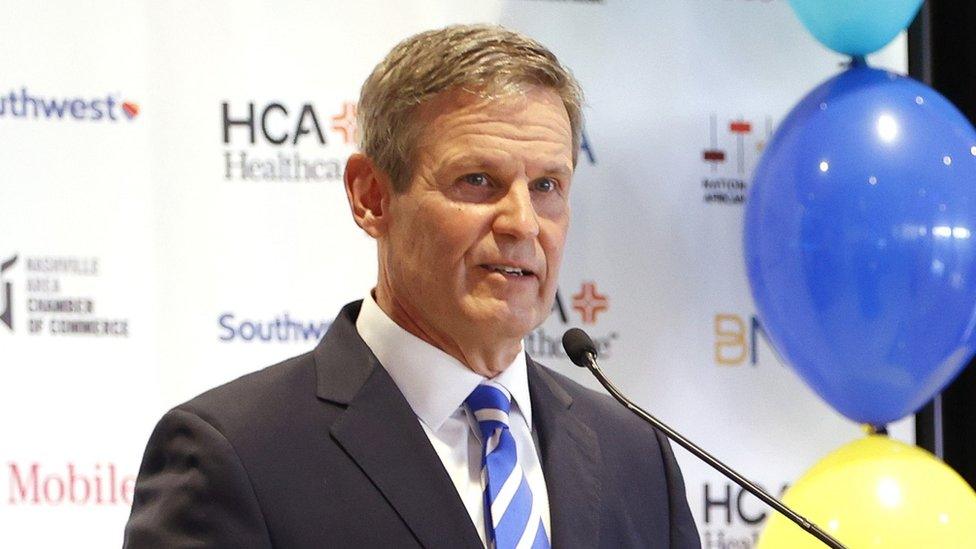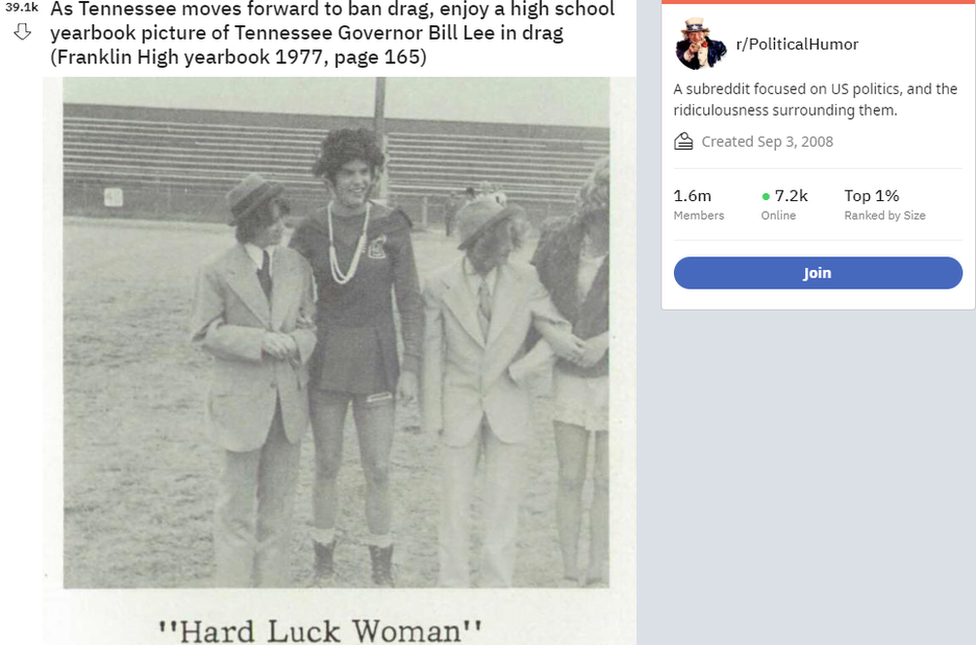Tennessee curbs trans treatment and drag for children
- Published

Tennessee Governor Bill Lee signed the bills
Tennessee's governor has signed laws banning drag performances in front of children and restricting medical treatment for transgender youth.
Civil rights and LGBT groups vowed to sue to stop the medical treatment measure from taking effect on 1 July.
Violators of the new drag law, meanwhile, face nearly a year in jail and a fine of up to $2,500 (£2,100).
Governor Bill Lee enacted the laws as questions were asked about an old photo apparently of him in women's clothing.
When it comes into force next month, the drag law will ban performances "harmful to minors" by "go-go dancers, exotic dancers, strippers, male or female impersonators" in public places or venues where they could be viewed by children.
The statute is the first of its type to be enacted in the US after a recent flurry of similar laws proposed in Republican-run states.
Governor Lee, a Republican, has rejected allegations he is being hypocritical by signing the law.
He has faced questions over a photo posted over the weekend on Reddit labelled "Tennessee Governor Bill Lee in drag", purportedly from a 1977 school yearbook photo. The person in the picture seems to be wearing a cheerleader's uniform, curly wig and a pearl necklace.

Governor Bill Lee is accused of wearing women's clothing in this 1977 yearbook photo
Mr Lee was asked about the photo earlier this week during a press conference.
"What a ridiculous, ridiculous question that is," he responded, without confirming or denying the authenticity of the image.
"Conflating something like that to sexualised entertainment in front of children, which is a very serious subject."
His office later issued a statement: "The bill specifically protects children from obscene, sexualised entertainment, and any attempt to conflate this serious issue with light-hearted school traditions is dishonest and disrespectful to Tennessee families."
What exactly the law will prohibit is still unclear.
One of its sponsors, state legislator Chris Todd, previously called drag shows "child abuse" no matter what they contain, according to the Tennessean newspaper, external.
But other Republicans say the law would not broadly affect drag shows that are legal under Tennessee's existing laws on obscenity.
Opponents of the law, including the state legislature's Democrats, argue that this new legislation is redundant because they say sexualised performances in front of children are already illegal under Tennessee law.

A drag performance at Nashville Pride last year
Bills to restrict drag events have been introduced in recent months in at least 14 different states, according to Pen America, external, a free-speech organisation.
Drag performances at libraries, which usually involve reading storybooks to children, have been the target of protests by religious organisations, parents' groups, right-wing activists, and extremists including the Proud Boys.
Opponents say such shows aim to groom or sexualise young children. Performers and LGBT groups say the events are age-appropriate and educate children about being different.
LGBT groups say they are worried about the potential chilling effect of the law. Chris Sanders, of the Tennessee Equality Project, says drag show organisers in the state are considering cancelling or delaying performances until there is clarity around the legislation.
The law restricting medical treatment for transgender youth prohibits doctors from providing hormones or surgical treatment for minors, with a few limited exceptions. Children and teenagers under 18 who are already receiving such treatment can continue to receive it until April 2024.
Doctors who violate the law could be fined up to $25,000 (£21,000) per procedure.
House Majority Leader William Lamberth, a Republican, said children are not mature enough to make "life-altering" decisions about such operations or medication.
"These treatments and procedures have a lifetime of negative consequences that are irreversible," he said, reports the Tennessean, external.
But the American Civil Liberties Union and Lambda Legal, an LGBT civil rights organisation, said they would sue to stop the legislation from being enforced.
"We are dedicated to overturning this unconstitutional law and are confident the state will find itself completely incapable of defending it in court," the organisations said in a statement.
Enforcement of similar laws in other states, including Alabama and Arkansas, has been paused by lawsuits.
Related topics
- Published20 February 2019

- Published27 January 2023
